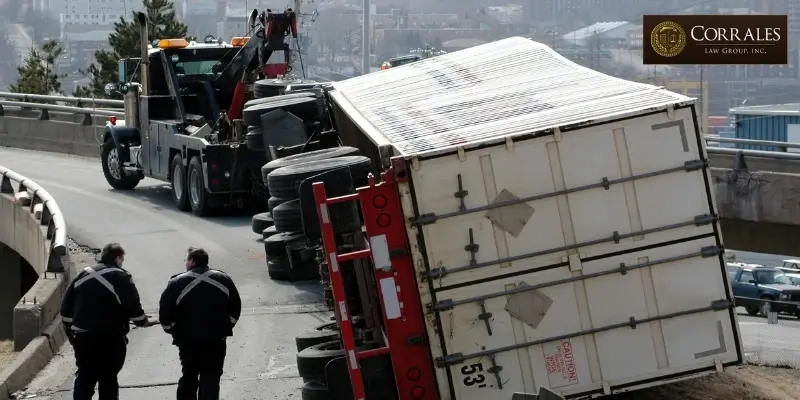|
|
Last Modified on Oct 26, 2024
Dealing with the aftermath of a truck accident can be overwhelming, especially when you are trying to handle things without the help of an experienced truck accident lawyer. When deciding to pursue legal action, you must adhere to the California truck accident statute of limitations. Otherwise, you could risk losing your only opportunity to seek compensation for what happened to you. A lawyer can advise you on the most appropriate way to pursue your case.
California Truck Accident Statute of Limitations
Every state in the country has a predetermined statute of limitations for cases involving personal injuries. Maintaining a statute of limitations is a way to ensure that individuals who need immediate financial relief are able to legally pursue it.
It can be difficult to recall details of an accident that occurred years or even decades prior. By keeping the statute of limitations close, individuals who are building their cases are encouraged to act quickly. Pursuing a claim sooner rather than later also ensures victims can recall important details relevant to their case.
When you decide that taking legal action for your truck accident case is the route you would like to take, you should pay close attention to the state of California’s statute of limitations for personal injury cases, including those resulting from a truck accident.
For most truck accident cases, you are given two years to establish solid grounds for your claim, develop a case, gather the necessary evidence, hire an experienced truck accident lawyer, and file a claim for damages.
If you are unable to file your claim before two years have passed, there is a fair chance that your case will be dismissed, your claim will be tossed out, and you will lose your chance to legally pursue compensatory damages. Building a strong truck accident case can take a lot more time than you might think, so you should consider starting yours as soon as possible. If you’re worried your case isn’t strong enough, see a lawyer.
What To Do After a Truck Accident
While knowing the statute of limitations can be smart for your case, understanding the most effective way to handle the immediate aftermath of your accident can be just as beneficial in the long run. Every decision you make after an accident can influence the accident claim in some way. Being able to make informed decisions at the right time can make all the difference. Here are some important ways you can protect your claim:
- Keep Yourself Calm: It can be very difficult to keep yourself calm after being in a truck accident and it may feel almost impossible. Still, it is a necessity to keep a level head in the wake of a chaotic situation. Giving in to panic can make things worse for you in the long run. Take a deep breath, gather your thoughts, and start assessing your situation.
- Never Flee the Scene: When you are in an accident, you may feel the desire to just drive away and act as though it never happened. Doing this could not only negatively impact your accident claim but also likely result in severe legal penalties. California state law declares it illegal to flee the scene of an accident, especially if the accident resulted in injuries, death, or serious property damage.
- Call 911: It is important that you call 911 as soon as you possibly can to get law enforcement and EMTs to the scene for immediate assistance. Having the accident scene secured could provide you with some sense of assurance that things are being handled in the right way.
- Check Yourself for Injuries: Once you have calmed yourself down, you should check yourself and others for injuries. Look out for blood, bruises, sprains, protrusions, and broken bones. If you are in serious pain but can’t find any injuries, mention that to the EMTs when they arrive. Your injuries may be internal.
- Meet With a Lawyer: When you are finally ready to pursue your claim and build a case, you should reach out to an experienced truck accident lawyer who can help you.
FAQs
How Long After a Truck Accident Can You Claim Damages in California?
In California, you have a time limit of two years to claim personal injury damages after the date of a truck accident. For property damages, however, the statute of limitations extends to three years. If you do not file a claim within the specified time period, you may lose the right to pursue damages. In some personal injury cases, when injuries aren’t immediately apparent, it may be possible to extend the deadline
Should I Move My Car After a Truck Accident?
You should move your car after a truck accident if it is blocking oncoming traffic and if it is safe to do so. The last thing you want to do is inadvertently cause another accident because your car is sitting in the middle of the road. Generally, it is appropriate to move to the side of the road after an accident, but this may not always be possible.
What Information Should I Get From the Truck Driver?
When you have to exchange insurance and contact information with the truck driver, it is vital to your claim that you get the following information from them:
- Name
- Address
- Phone Number
- Trucking Company Name
- Trucking Company’s Address and Phone Number
- Driver’s License Number
- Insurance Company
- Insurance Policy Number
With this information, you can ensure you can get in contact with everyone you will need to speak with.
What Happens if I Can’t Contact the Trucking Company?
If you are unable to contact the trucking company on your own, your lawyer may be able to do so on your behalf. Following a truck accident, the company that owns the involved truck may be hard to reach. A lawyer may be able to track them down and make sure they are held accountable if necessary.
Reach Out to the Corrales Law Group Today
At the Corrales Law Group, we know the most effective ways to handle the aftermath of a truck accident for our clients. Reach out to us today to schedule a consultation with a valued team member.




